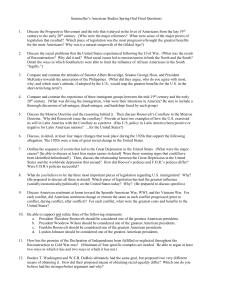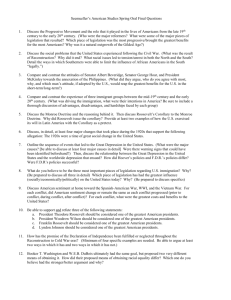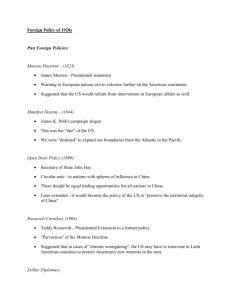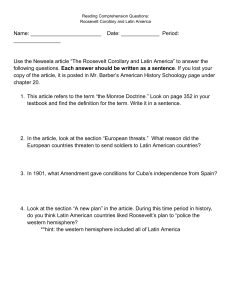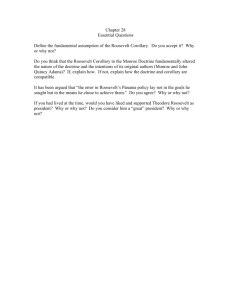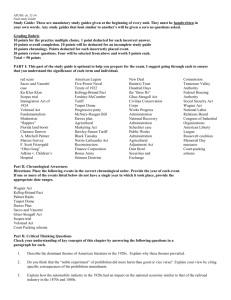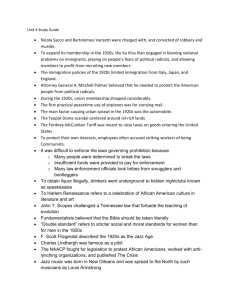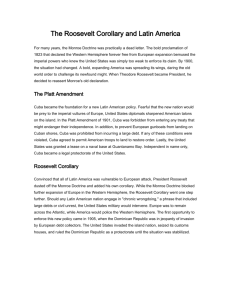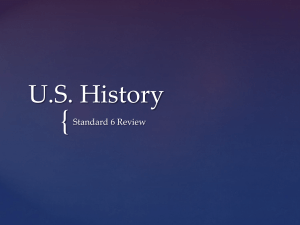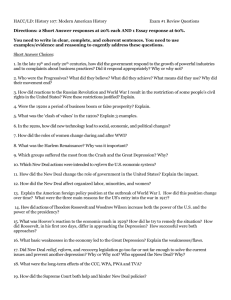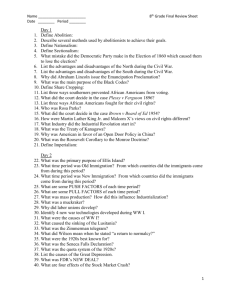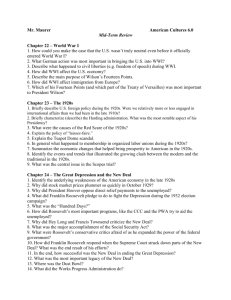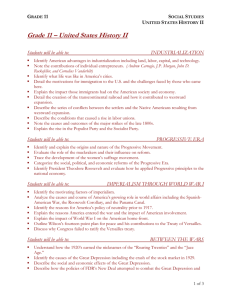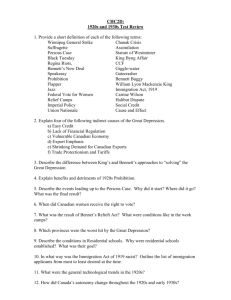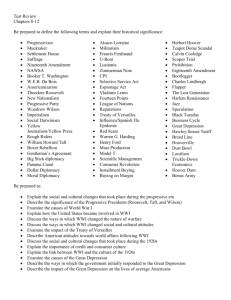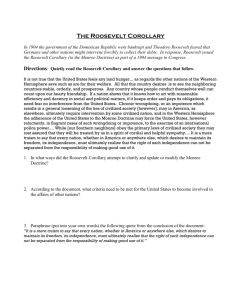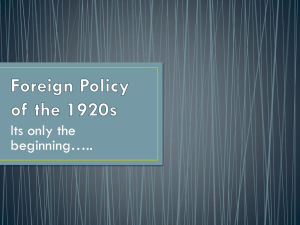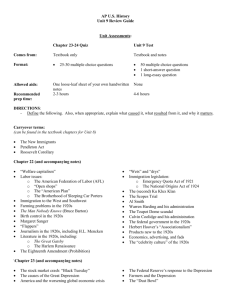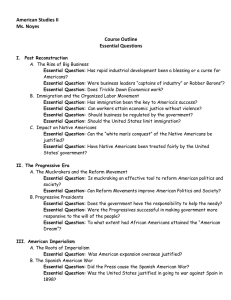Oral finals questions:
advertisement
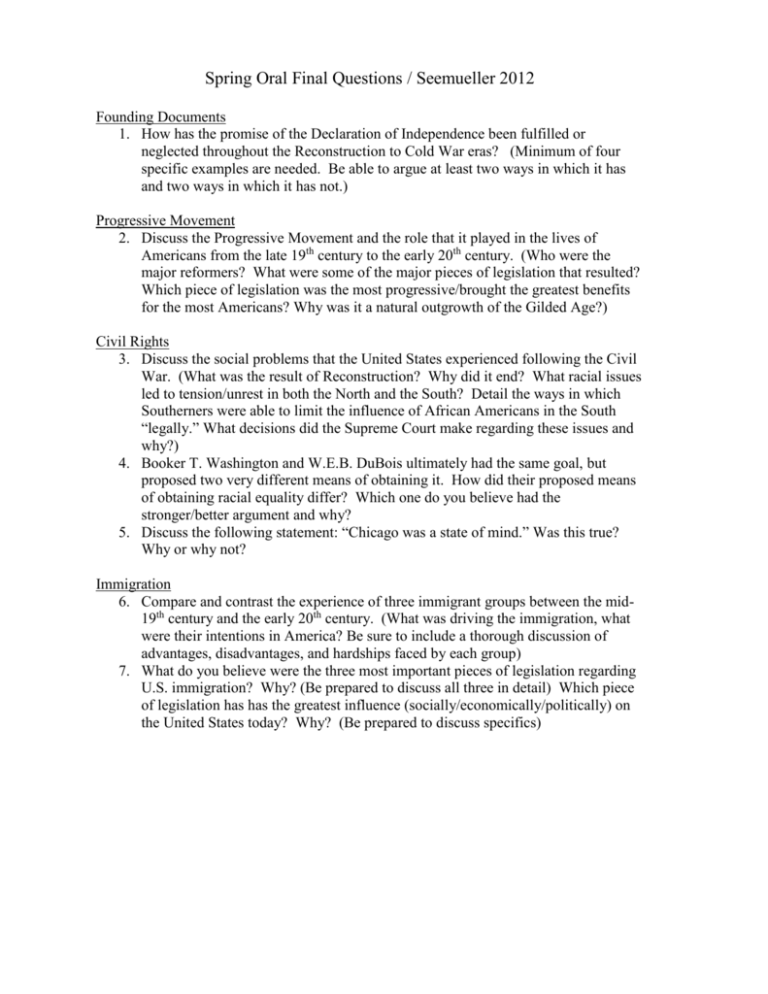
Spring Oral Final Questions / Seemueller 2012 Founding Documents 1. How has the promise of the Declaration of Independence been fulfilled or neglected throughout the Reconstruction to Cold War eras? (Minimum of four specific examples are needed. Be able to argue at least two ways in which it has and two ways in which it has not.) Progressive Movement 2. Discuss the Progressive Movement and the role that it played in the lives of Americans from the late 19th century to the early 20th century. (Who were the major reformers? What were some of the major pieces of legislation that resulted? Which piece of legislation was the most progressive/brought the greatest benefits for the most Americans? Why was it a natural outgrowth of the Gilded Age?) Civil Rights 3. Discuss the social problems that the United States experienced following the Civil War. (What was the result of Reconstruction? Why did it end? What racial issues led to tension/unrest in both the North and the South? Detail the ways in which Southerners were able to limit the influence of African Americans in the South “legally.” What decisions did the Supreme Court make regarding these issues and why?) 4. Booker T. Washington and W.E.B. DuBois ultimately had the same goal, but proposed two very different means of obtaining it. How did their proposed means of obtaining racial equality differ? Which one do you believe had the stronger/better argument and why? 5. Discuss the following statement: “Chicago was a state of mind.” Was this true? Why or why not? Immigration 6. Compare and contrast the experience of three immigrant groups between the mid19th century and the early 20th century. (What was driving the immigration, what were their intentions in America? Be sure to include a thorough discussion of advantages, disadvantages, and hardships faced by each group) 7. What do you believe were the three most important pieces of legislation regarding U.S. immigration? Why? (Be prepared to discuss all three in detail) Which piece of legislation has has the greatest influence (socially/economically/politically) on the United States today? Why? (Be prepared to discuss specifics) Foreign Policy 8. Be able to compare and contrast the attitudes of Senator Albert Beveridge, Senator George Hoar, and President McKinley towards the annexation of the Philippines. (What did they argue, who do you agree with most, why, and which man’s attitude, if adopted by the U.S., would reap the greatest benefits for the U.S. in the short-term/long-term?) Also, be able to discuss the Monroe Doctrine and the reasoning behind it. Then discuss Roosevelt’s Corollary to the Monroe Doctrine. Why did Roosevelt issue the corollary? Provide at least two examples of how the U.S. exercised its will in Latin America with the Corollary as a pretext. (Has U.S. policy in Latin America been positive or negative for Latin American nations? …for the United States?) 9. Discuss American sentiment at home toward the Spanish-American War, WWI, and the Vietnam War. For each conflict, did American sentiment change or remain the same as each conflict progressed (prior to conflict, during conflict, after conflict)? For each conflict, what were the greatest costs and benefits to the United States? 1920s and Depression 10. Discuss, in detail, at least four major changes that took place during the 1920s that support the following allegation: The 1920s were a time of great social change in the United States. 11. Outline the sequence of events that led to the Great Depression in the United States. (What were the major causes? [be able to discuss at least four major causes in detail] Were there warning signs that could have been identified beforehand?) Then, discuss the relationship between the Great Depression in the United States and the worldwide depression that ensued? How did Hoover’s policies and F.D.R.’s policies differ? What did F.D.R. try? Were F.D.R’s policies successful? Presidents 12. Be able to discuss the major political, social, and economic accomplishments of each of the following presidents: a. Woodrow Wilson b. Franklin Roosevelt c. Lyndon Johnson d. Ronald Reagan
